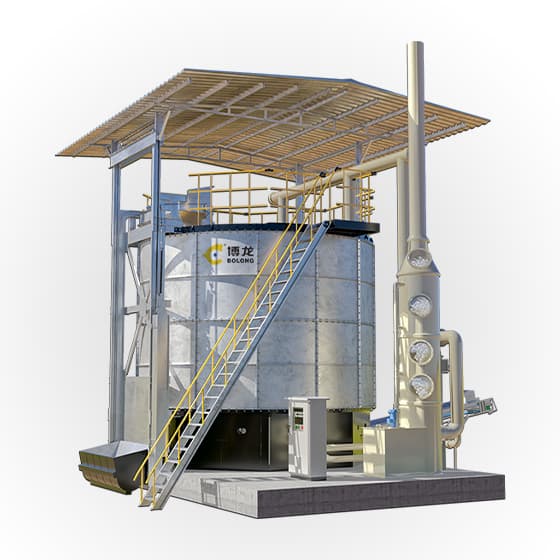In modern farming, composting is not only an effective way to treat organic waste, but also the key to achieve sustainable development. However, with the improvement of environmental protection requirements, traditional composting methods have gradually revealed their limitations and cannot meet the needs of large-scale farming. In this context, the emergence of large-scale commercial composting tanks can undoubtedly solve this problem and become a key solution to promote the transformation and upgrading of farms. The beginning of this equipment not only conforms to the trend of the times, but also brings new possibilities for waste management in farms.
This is an efficient organic waste treatment facility. Its core concept is to simulate the decomposition process in nature and convert organic materials such as kitchen waste, livestock and poultry manure, and agricultural waste into high-quality organic fertilizers in a scientific and large-scale manner. This tank is like a huge “green magician”. It cleverly uses the power of microorganisms to transform these seemingly useless garbage into gold that nourishes the land. It not only realizes the recycling of resources, but also contributes to the cause of environmental protection.
The function of the large compost tank is carefully conceived and operated. Firstly, it features an automated control system to closely monitor the temperature, humidity and ventilation within the tank, thereby creating“working conditions”beneficial for the microorganisms. These microorganisms will reproduce quickly and break down the available organic matter in suitable conditions, thereby releasing energy and nutrients in the process. Secondly, the enclosed nature of the tank helps to eliminate bad smells and insects ensuring the surrounding area remains clean. Lastly, large composting tanks, through periodic turning and aeration, can accelerate the decomposition of organic matter and reduce composting time. They produce quality organic fertilizers for agricultural and landscaping use, ensuring nutrients are delivered at the right time. This process turns waste into wealth while conserving resources and helping to make the world a better place.

The introduction of larger composting tanks on farms has revolutionized waste management practices and has become increasingly central to the principles of organic farming. They boost the efficiency of waste treatment to a higher level by creating a controlled environment for carrying out the fermenting function. The normal way of composting takes much time however using the composting tank it takes several days to complete the entire conversion process and minimize the cost of labor while yielding a top-grade compost.
Concerning the quality of the compost produced, bacterial cultures recommend the use of compost tanks as they enhance the activities of the microbes and beneficial bacteria. This does not only increase the contents of nitrogen, phosphorus and potassium nutrients, but also makes sure that all forms of weeds and their seeds, and pathogenic spores stick away from the compost. This organic fertilizer promotes soil and crop growth while minimizing the use of chemical fertilizer at landscaping and construction. All of which contribute to up-cycling of waste that would have otherwise contributed to pollution, and improving greenness and health of our planet.
The environmental benefits of large composting tanks are also significant. They effectively reduce harmful gas emissions from farms and alleviate environmental pollution problems; at the same time, they reduce the spread of unpleasant odors, making farms cleaner and more hygienic, thereby preventing the spread of infectious diseases.
In terms of economy, although the initial investment is high, in the long run, commercial compost tanks bring considerable returns to farms by saving waste treatment costs and organic fertilizer sales revenue. This efficient resource conversion model will promote the sustainable development of the breeding industry.
Bolong Company has been deeply involved in the breeding industry since 1993 and has accumulated more than three decades of industry experience. At the critical moment of facing the transformation difficulties of the breeding industry, our leader Mr. Zhang Xueliang was determined to forge ahead and led Bolong people to study composting tanks. We introduced advanced technology and production machinery, formed a professional scientific research team, actively explored new composting technologies at home and abroad, and finally successfully developed Bolong’s own large-scale commercial composting tank, ensuring that every component is carefully designed.

Bolong composting tank has more than 20 independent patent technologies to ensure the advancement and high quality of the product. Since its launch, Bolong compost tank has been popular in China and has been successfully exported to more than 30 countries, attracting much attention from the international market. According to the feedback from our Southeast Asian customers, Bolong compost tanks have effectively solved the problem of stacking livestock and poultry manure carcasses in tropical areas, and met the requirements of their local environmental protection policies, helping them solve the imminent problem.
Large-scale compost tanks, with their excellent technology and efficient design, are leading the breeding industry towards sustainable development. Bolong’s large-scale commercial composting tank is not only the crystallization of technology, but also a commitment to environmental responsibility. As Bolong continues to expand its international market, we believe that this innovative solution will help more farms around the world achieve green transformation and create a bright future of sustainable development. Let us look forward to more possibilities and hopes that Bolong will bring to the breeding industry! Welcome to connect with us!